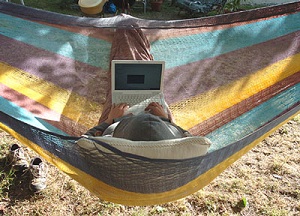
When I was growing up, my mother enjoyed including a bit of education in our family vacations. She read to us from many sources about our intended destination, preparing us to be observant and appreciative. As a young girl, I read aloud – at her prompting – from guidebooks, tourist bureau brochures, and travel magazines. These days, my mother still e-mails me travel information from many websites, though reading aloud is now optional. Mom’s creative approach to vacation planning sought out off-the-beaten-path sights where we had a better chance of learning something. This early preparation also required us to think through the items we needed to pack to make our agenda attainable, from extra layers of clothing to special equipment.
She purposefully overloaded every day’s schedule, grouping our options for geographic areas of the destination. With three kids, she knew to expect the unexpected and that you can’t always plan for it, so instead she planned to accommodate the necessary flexibility. Sometimes the need for flexibility arose from external sources, so we always packed a map that we had studied in advance and could reference quickly on site. Likewise, we had already reviewed our transportation options so that we were familiar with the available means and routes to allow for quick on-the-spot adjustments. She raised me to embrace these interruptions, saying “sometimes the times you get lost are when you make the best discoveries.”
We joined docent-led architectural walks in Chicago, climbed the Mayan ruins in Costa Maya (Mexico), attended off-Broadway plays in New York City, attempted our limited French at the Quebec World Music Festival, and learned to play the washboard with spoons in New Orleans, though Washington DC was the mother-load of educational sight-seeing. All along the way, mom encouraged us to ask questions and to explore as we toured, capturing what we experienced and what we drew out of that in our daily journaling.
“The keyword for our vacation wasn’t relaxation, it was adventure.” — my mom
With this personal history, I found the idea of a testing vacation very natural when I participated in Weekend Testing Americas two weeks ago. In my daily work, I am familiar with exploratory testing as a chartered but loosely structured activity. I start with a time box and a list of test ideas to guide my testing in the direction of acceptance criteria for a story, but I never script steps of a test case. However, WTA presented us with this mission, should we choose to accept it:
We want to explore this application and find as many short abbreviated charters as possible.
You have 30 minutes to come up with as many “testing vacations” as you can consider. The goal is that no single vacation should take more than five minutes. Shorter is better.
I paired with Linda Rehme and we tested Google Translate in these ways:
- testing in Firefox 8 and Chrome
- prompt to use new feature of reordering text in the result
- selecting alternate translations of phrases in the result
- manually editing translations of phrases (or alternate translates) of the result
- moving result text with capitalization
- moving result text with punctuation
- couldn’t reorder words within a phrase of the result text
- re-translate to revert to the original result text
- Listen to both source and result text
- manually editing text of the result to include words in another language and then Listen
- Listen didn’t work for both of us
- icons for Listen and Virtual Keyboard displayed in Firefox 8 but not Chrome
- different drag hardware controls (laptop touchpad, laptop nub)
- virtual keyboard for German (Deutsch)
- moving virtual keyboard around in the browser
- switching virtual keyboard between Deutsch and
- misspelling words
- prompted to use suggested spelling
- prompted to select detected source language
- Turn on/off instant translation
- translating a single word with instant turned off displaying a list of results
When time was up, our moderators prompted us, “First, describe your “vacation”. Then describe what you saw while you were on vacation. And finally, what you wished you had done while you were on vacation (because really, there’s never enough time to do everything).”
My pair of testers noticed that different browsers displayed different controls, features worked in some browsers and not in others (e.g. Listen), result phrases could be manipulated as a unit but couldn’t be broken apart, and moving result phrases around did not correct either the capitalization or punctuation. I really wanted to go down the rabbit hole of having instant translation turned off because I immediately saw that result text didn’t clear and then clicking the translate button for a single word produced a different format of results (i.e. list of options below the result text). In fact, I found myself full of other testing vacation ideas and it was hard to keep track of them as I went along, testing rapidly. The best I could do was jot them down as I went while typing up descriptions of the testing we had completed. I enjoyed the rapid pace of the testing vacation exercise with its familiar exploratory testing style.
Weekend Testers Americas: Claire, the idea when you find that you are doing too many things is to step back and try to do just one. It’s like touring the Louvre. You can’t take it all in in one sitting. (Well, you can, but it would be severe information overload. 🙂
Claire Moss: I liked that this accommodated my “ooh shiny!” impulses, so don’t get me wrong.
Weekend Testers Americas: Yes, testing vacations and “Ooh, shiny!” go *very well together 😀
Fortunately, my mom was always up for indulging those “Ooh, shiny!” impulses on vacations as I was growing up and now I have a new way to enjoy my testing time at work: testing vacations.
[I took the liberty of correcting spelling and formatting of text from the WTA #22 session.]
